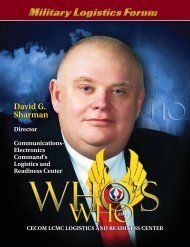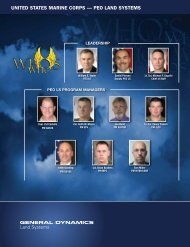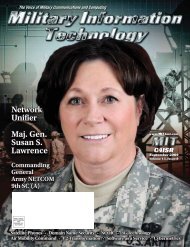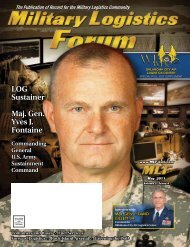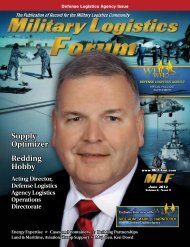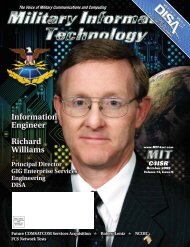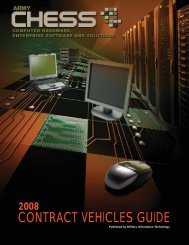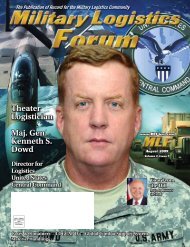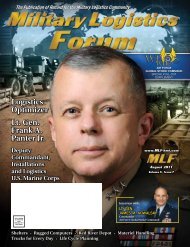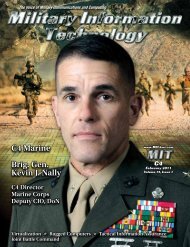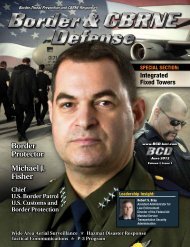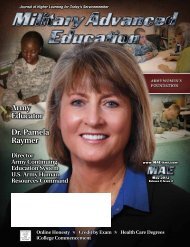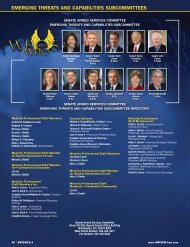Air Warrior Col. John W. Thompson - KMI Media Group
Air Warrior Col. John W. Thompson - KMI Media Group
Air Warrior Col. John W. Thompson - KMI Media Group
Create successful ePaper yourself
Turn your PDF publications into a flip-book with our unique Google optimized e-Paper software.
Act Globally, Talk Locally<br />
wa r a n D w o r D s: Co u r s e s, H a r D w a r e let s o l D i e r s C o m m u n i C a t e w i tH l o C a l s.<br />
The United States has fought much bigger<br />
wars than the war on terror, but it has<br />
never fought in so many places, and in so<br />
many ways, where speaking so many local<br />
languages is so essential. The challenge of<br />
communicating globally has expanded traditional<br />
language instruction and led to rapid<br />
innovation in technology to bridge communication<br />
gaps. The Holy Grail of technology is<br />
a field device that can do two-way translation<br />
of natural speech. That may be coming soon.<br />
The U.S. Army’s <strong>John</strong> F. Kennedy Special<br />
Warfare Center and School now runs the<br />
second-largest language school in the country,<br />
after the Defense Language Institute<br />
in Monterey, Calif., according to Lieutenant<br />
<strong>Col</strong>onel Rusty Nance, chief of Language and<br />
Human Dynamics. His school trained 2,000<br />
students in 13 foreign languages this year and<br />
expects to ramp up to 17 languages for 2,100<br />
students next year.<br />
“Unlike Monterey, we seek oral proficiency<br />
only, listening and speaking,” Nance<br />
explained. The goal is proficiency of 1+ as<br />
measured by International Language Roundtable<br />
(ILR) standards, though a simple 1 is<br />
sufficient for graduation.<br />
“The most important languages are for<br />
where the bullets are flying, like Arabic,<br />
32 | SOTECH 8.9<br />
Pashto and Urdu,” Nance said. “But Russian<br />
and Mandarin Chinese will also be important.”<br />
The Center has a major French program<br />
and is tentatively planning to add Czech,<br />
Hungarian and Polish.<br />
The students are all Army and special<br />
operations forces with military occupational<br />
specialties of 18 or 18A for SOF officers, 37 for<br />
Army military information support or 38 for<br />
civil affairs. Other services have similar and<br />
quite good language programs, but these are<br />
orders of magnitude smaller than that at the<br />
Special Warfare Center.<br />
Language class takes five hours per day<br />
for four months in French, Spanish or Indonesian,<br />
six months for other languages. SOF<br />
soldiers must pass these courses before they<br />
go on to further training.<br />
The center has just started intermediate<br />
training, to ILR level 2+, for a select number<br />
of students and is considering going to<br />
ILR level 3+.<br />
Instructors are private contractors provided<br />
by MiLanguages, but this contract is up<br />
for bid. There is a push to bring instructors<br />
on board as government employees. This<br />
may be difficult, as the center must employ<br />
U.S. citizens, which many current instructors<br />
are not.<br />
By He n r y Ca n a D a y, soteCH Co r r e s p o n D e n t<br />
C a n a D a y H@k m i m e D i a g r o u p.C o m<br />
Personal instruction in classes is by far the<br />
best way to teach languages, Nance emphasized,<br />
and technology is only used for reinforcement.<br />
The center uses Rosetta Stone,<br />
CL-150’s Rapid Rote and authentic materials<br />
like broadcast feeds for reinforcement.<br />
In addition to language, all center students<br />
are trained in the cultures of intended<br />
deployment locations. And long after they<br />
leave the center, soldiers can still tap its<br />
resources. Nance has a sustainment program<br />
for deployed troops to help them<br />
retain their new language, and even a contingency<br />
program for soldiers trained in one<br />
language but assigned to another location.<br />
Transparent Language developed CL-150,<br />
an extremely broad suite of products and<br />
services to help train and assess soldiers in<br />
about 80 critical languages. President Michael<br />
Quinlan said special operations as well as<br />
Marine, Navy and <strong>Air</strong> Force units have enterprise-wide<br />
licenses to use CL-150 both in<br />
the United States and in theater, online or<br />
off, for both initial training and refresher<br />
courses<br />
“Where we differ from other language<br />
products is that we support learning for special<br />
government purposes,” Quinlan said. “We<br />
go far beyond the standard conversations.”<br />
www.SOTECH-kmi.com




